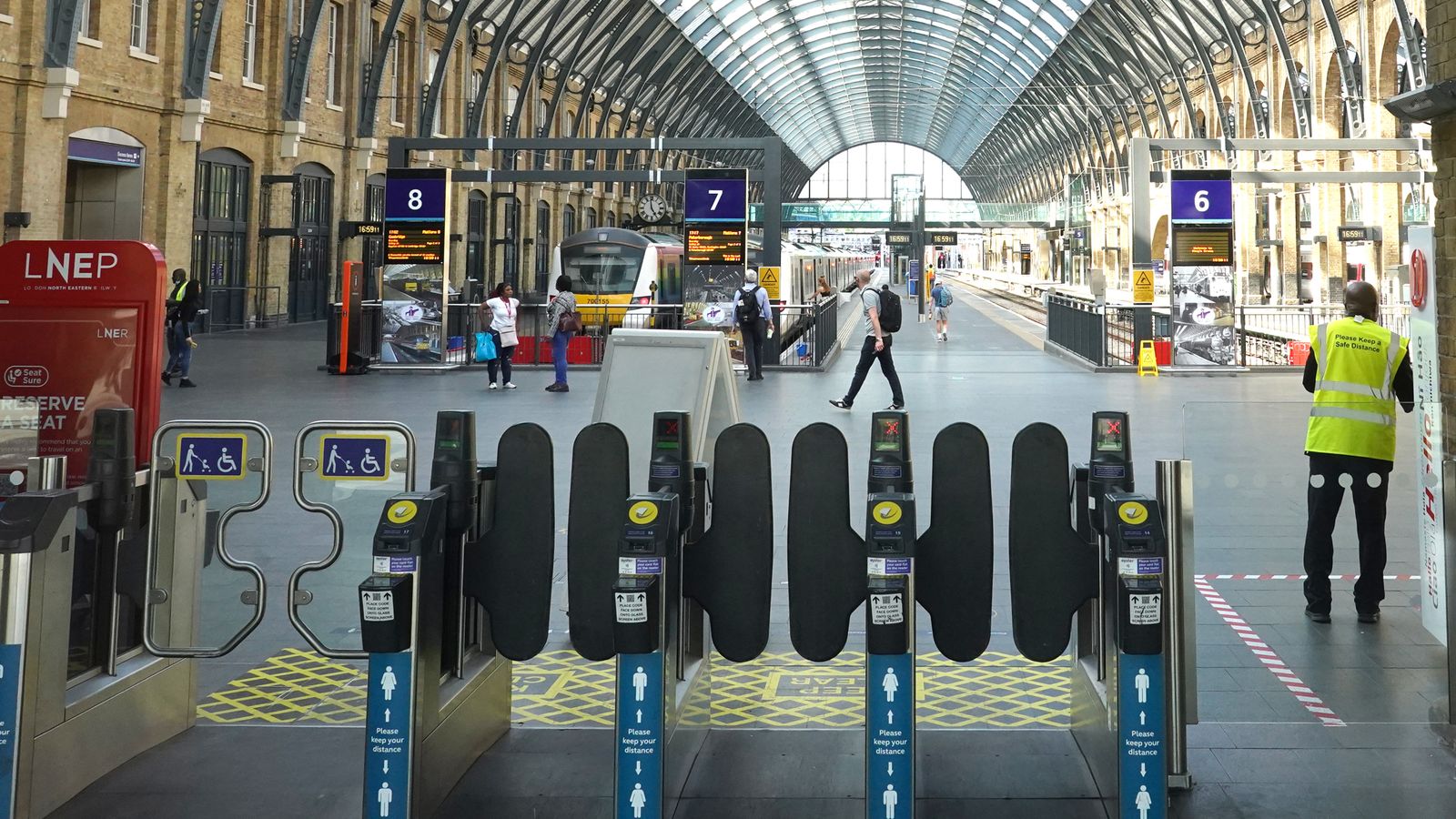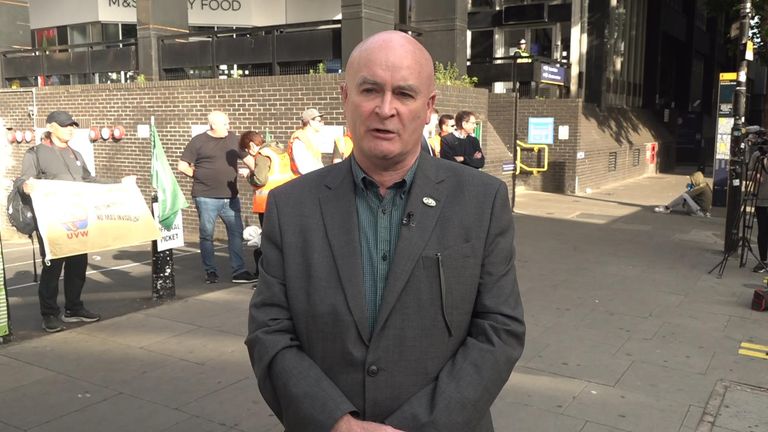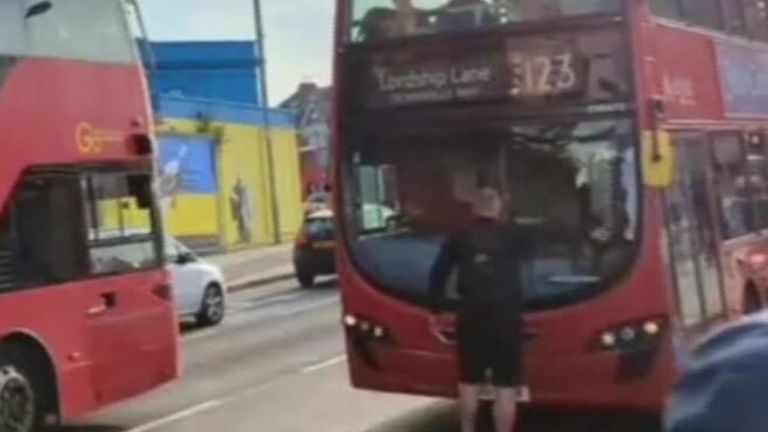Millions of people have been hit by severe travel disruption on the first day of the biggest rail strike for a generation – with passengers set to face more cancellations tomorrow.
Although it is not officially a strike day on Wednesday, only 60% of trains are expected to run – mostly because of a delay to the start of services, as signallers and control room staff are not doing overnight shifts.
Strikes are also planned for this Thursday and Saturday.
‘Do not travel’ warnings in place – live rail strike updates
On Tuesday, just a fifth of trains ran and half of lines were closed – as around 40,000 members of the Rail, Maritime and Transport (RMT) union at Network Rail and 13 operators walked out in a row over pay, jobs, and conditions.
It was Britain’s biggest rail strike for 33 years, with RMT general secretary Mick Lynch hailing the “fantastic” turnout at picket lines which “exceeded expectations”.
Vowing to “continue the campaign”, he said RMT members were “leading the way for all workers” left “sick and tired of having their pay and conditions slashed by a mixture of big business profits and government policy”.
“Now is the time to stand up and fight for every single railway worker in this dispute that we will win,” he added.
Strike hits the railway and beyond on first day
Last trains were much earlier than normal, such as London Euston to Glasgow at 1.30pm and London King’s Cross to Edinburgh at 2pm. The network was due to shut down at 6.30pm.
Much of Britain had no passenger trains for the entire day, including most of Scotland and Wales, the whole of Cornwall and Dorset, and places such as Chester, Hull, Lincoln, and Worcester.
When train services were running, many passengers’ journeys took several hours longer than normal, while those who chose to travel by car were impacted by a surge in traffic.
The congestion level in London was 26 percentage points higher this morning than it was on previous Tuesdays, data from TomTom shows.
Congestion levels are the extra time drivers need to complete a journey compared to the time to travel the same distance with uncongested roads.
People travelling by car or buses in the capital between 6am and 10am needed an average of 72% more time, compared to the 45% extra time needed on average during the past three Tuesdays.
Travel time almost doubled in London between 8am and 9am.
Read more:
Everything you need to know about the rail strikes
Passengers share their travel woes
Worker explains reasons for walkout saying it has ‘nothing to do with money’
City centre footfall drops to lockdown levels
Usually busy train stations such as London Euston and Birmingham New Street were nearly deserted except for union picket lines.
London Underground services were also suspended on most lines due to a staff walkout.
Many people worked from home rather than travelled to offices.
Retail analysts Springboard said footfall in central London was 27% down on last Tuesday, while city centres outside the capital suffered an 11% reduction.
‘I didn’t sleep very well’
In London, Rene Mance said the travel chaos had disrupted her journey to Glastonbury Festival, where she was starting a new job.
“I can’t pretend it hasn’t been stressful. It has. I didn’t really sleep very well because I was worried about it,” the 47-year-old said, adding she had arrived two hours before her train was due to depart in fear of unforeseen complications.
Due to travelling with heavy luggage, Ms Mance said she felt getting the bus would cause problems and was forced to pay almost £40 for a taxi to the station.
At Leyton Sixth Form, in east London, two students, Emmanuella Ameyaw and Harriet Owusu-Afriyie, spent more than an hour travelling to make it in time for their Religious Studies A-level exam.
They both live locally and normally travel by bus, but Harriet said she had to get a taxi from halfway because the traffic was so bad.
At Lordship Lane bus station, in southeast London, a frustrated commuter blocked the path of a bus and demanded the driver open its doors.
Will talks continue?
The RMT has been asked by Network Rail to attend formal consultation talks next month on introducing “modern working practices”.
Network Rail official Tim Shoveller said the changes will mean “dumping outdated working practices and introducing new technology”.
He added: “We expect this will reduce roles by around 1,800, the vast majority of which will be lost through voluntary severance and natural wastage.”
A Department for Transport spokesperson said: “These are desperately needed reforms that modernise the railway and put it on a sustainable footing for passengers and taxpayers.
“Unions have shut down big parts of the rail network, hitting local businesses and unfairly cutting people off from hospitals, schools and work.
“However, early data shows that unlike in the past many people now have the opportunity to work from home, so we haven’t even a rush to the roads, as traffic has instead gone online, which means the unions aren’t having the overall impact they might have hoped.”
Talks between the RMT, Network Rail and train companies will resume on Wednesday.




